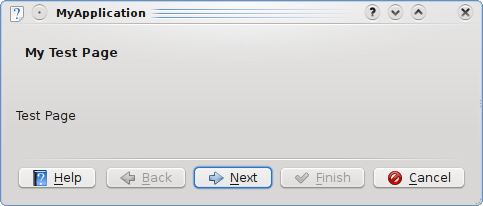KAssistantDialog Class
This class provides a framework for assistant dialogs. More...
| Header: | #include <KAssistantDialog> |
| CMake: | find_package(KF6 REQUIRED COMPONENTS WidgetsAddons)target_link_libraries(mytarget PRIVATE KF6::WidgetsAddons) |
| Inherits: | KPageDialog |
Public Functions
| KAssistantDialog(QWidget *parent = nullptr, Qt::WindowFlags flags = Qt::WindowFlags()) | |
| QPushButton * | backButton() const |
| QPushButton * | finishButton() const |
| bool | isAppropriate(KPageWidgetItem *page) const |
| bool | isValid(KPageWidgetItem *page) const |
| QPushButton * | nextButton() const |
| void | setAppropriate(KPageWidgetItem *page, bool appropriate) |
| void | setValid(KPageWidgetItem *page, bool enable) |
Public Slots
Protected Functions
| KAssistantDialog(KPageWidget *widget, QWidget *parent = nullptr, Qt::WindowFlags flags = Qt::WindowFlags()) |
Detailed Description
An assistant dialog consists of a sequence of pages. Its purpose is to guide the user (assist) through a process step by step. Assistant dialogs are useful for complex or infrequently occurring tasks that people may find difficult to learn or do. Sometimes a task requires too many input fields to fit them on a single dialog.
Create and populate dialog pages that inherit from QWidget and add them to the assistant dialog using addPage().
The functions next() and back() are virtual and may be reimplemented to override the default actions of the next and back buttons.

Member Function Documentation
[explicit] KAssistantDialog::KAssistantDialog(QWidget *parent = nullptr, Qt::WindowFlags flags = Qt::WindowFlags())
Construct a new assistant dialog with parent as parent.
parent is the parent of the widget.
flags the window flags to give to the assistant dialog. The default of zero is usually what you want.
[explicit protected] KAssistantDialog::KAssistantDialog(KPageWidget *widget, QWidget *parent = nullptr, Qt::WindowFlags flags = Qt::WindowFlags())
Construct an assistant dialog from a single widget.
widget the widget to construct the dialog with
parent the parent of the assistant dialog
flags the window flags to use when creating the widget. The default of zero is usually fine.
Calls the KPageDialog(KPageWidget *widget, QWidget *parent, Qt::WindowFlags flags) constructor
[virtual slot] void KAssistantDialog::back()
Called when the user clicks the Back button.
This function will show the preceding relevant page in the sequence. Do nothing if the current page is the first page in the sequence.
QPushButton *KAssistantDialog::backButton() const
Returns the finish button
QPushButton *KAssistantDialog::finishButton() const
Returns the finish button
bool KAssistantDialog::isAppropriate(KPageWidgetItem *page) const
Check if a page is appropriate for use in the assistant dialog.
page is the page to check the appropriateness of.
Returns true if page is appropriate, false if it is not
bool KAssistantDialog::isValid(KPageWidgetItem *page) const
return if a page is valid
page the page to check the validity of
See also setValid().
[virtual slot] void KAssistantDialog::next()
Called when the user clicks the Next/Finish button.
This function will show the next relevant page in the sequence. If the current page is the last page, it will call accept()
QPushButton *KAssistantDialog::nextButton() const
Returns the next button
void KAssistantDialog::setAppropriate(KPageWidgetItem *page, bool appropriate)
Specify whether a page is appropriate.
A page is considered inappropriate if it should not be shown due to the contents of other pages making it inappropriate.
A page which is inappropriate will not be shown.
The last page in an assistant dialog should always be appropriate
page the page to set as appropriate
appropriate flag indicating the appropriateness of the page.
If appropriate is true, then page is appropriate and will be shown in the assistant dialog. If false, page will not be shown.
See also isAppropriate().
void KAssistantDialog::setValid(KPageWidgetItem *page, bool enable)
Specify if the content of the page is valid, and if the next button may be enabled on this page. By default all pages are valid.
This will disable or enable the next button on the specified page
page the page on which the next button will be enabled/disable
enable if true the next button will be enabled, if false it will be disabled
See also isValid().